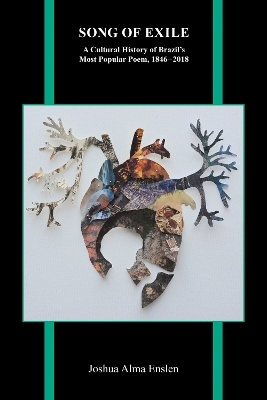
Song of Exile
Purdue University Press (Verlag)
978-1-61249-691-7 (ISBN)
Song of Exile: A Cultural History of Brazil's Most Popular Poem, 1846–2018 is the first comprehensive study of the influence of Antônio Gonçalves Dias's "Canção do exílio." Written in Coimbra, Portugal, in 1843 by a homesick student longing for Brazil, "Song of Exile" has inspired thousands of parodies and pastiches, and new variations continue to appear to this day. Every generation of Brazilian writers has adapted the poem's Romantic verses to glorify the wonders of the nation or to criticize it via parody, exposing a litany of issues that have plagued the country's progress over the years. Based on a core of five hundred texts painstakingly gathered over a five-year span, this book catalogs the networks of the poem's reinvention as pastiche and parody in Brazilian print culture from nineteenth-century periodicals to new media. Mapping the reoccurrences of the original's keywords and phrases over time, the book uncovers how the poem has been used by successive generations to write and rewrite the nation's history. This process of reinvention has guaranteed the permanency of "Song of Exile" in Brazilian culture, making it not only the nation's most popular poem, but one of the most imitated in the world.
Joshua Alma Enslen is an associate professor of Portuguese at West Point, where he directs the Portuguese program. He holds a PhD in Romance languages from the University of Georgia and a postdoctoral certificate of studies from the Materialities of Literature program at the University of Coimbra. His visual literary studies on "Song of Exile," created in collaboration with the artist Alaina Enslen, have been featured in solo exhibitions at the University of Coimbra's historic Museum of Science; at FOLIO 2016 in Óbidos, Portugal; and at the University of Lisbon's Caleidoscópio.
Acknowledgments
Chapter One: "Minha terra tem palmeiras" : A Brief Introduction to Brazil's Most Popular Poem
Chapter Two: "Adeus Coimbra inimiga": Precedents and Contexts
Chapter Three: "Onde canta o rouxinol": Early Portuguese Responses
Chapter Four: "Onde canta o periquito": The First Republic to the Vargas Era (1889–1945)
Chapter Five: "Minha terra só tem tanques": The Military Regime (1964–1985)
Chapter Six: "As sirenes que aqui apitam": Twenty-First-Century Songs of Exile (1999–2015)
Chapter Seven: "Sou ali": Variations by Female Authors (1867–2015)
Chapter Eight: "As aves que aqui twittam": Twitter, Instagram, and Beyond
Chapter Nine: The Word, the Database, and the Algorithm
Afterword: Literary Research as Data Art: An Experiment in Critical Reading (Manuel Portela)
Appendix: Table of 500 Texts
Notes
Works Cited
Index
| Erscheinungsdatum | 05.03.2022 |
|---|---|
| Reihe/Serie | Purdue Studies in Romance Literatures |
| Zusatzinfo | 5 illustrations |
| Verlagsort | West Lafayette |
| Sprache | englisch |
| Maße | 152 x 229 mm |
| Gewicht | 491 g |
| Themenwelt | Geisteswissenschaften ► Sprach- / Literaturwissenschaft ► Anglistik / Amerikanistik |
| Geisteswissenschaften ► Sprach- / Literaturwissenschaft ► Literaturgeschichte | |
| Geisteswissenschaften ► Sprach- / Literaturwissenschaft ► Literaturwissenschaft | |
| ISBN-10 | 1-61249-691-1 / 1612496911 |
| ISBN-13 | 978-1-61249-691-7 / 9781612496917 |
| Zustand | Neuware |
| Haben Sie eine Frage zum Produkt? |
aus dem Bereich


